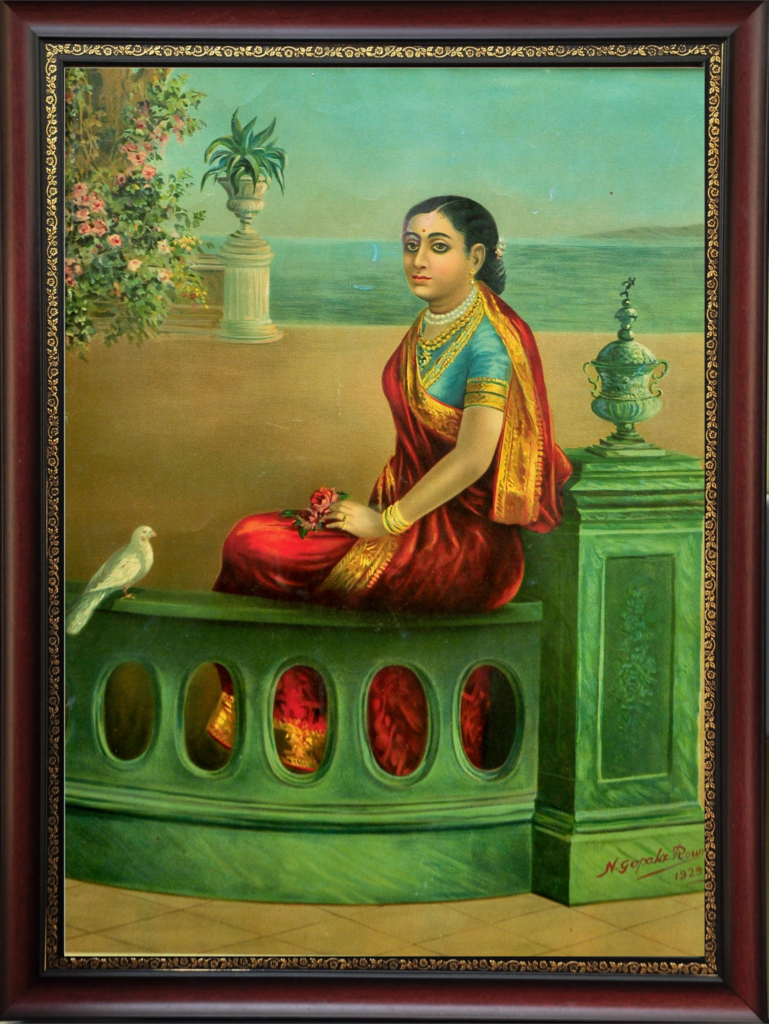Chitrangi
Chitrangi is one of the many remarkable works by N. Gopala Row, created in 1929. In this painting, the artist beautifully captures the innate grace of the Indian woman, Chitrangi. Gopala Row employs vibrant colours that enhance her beauty and elegance. The striking red sari and intricate jewellery, combined with the picturesque background, bring the scene to life.
The painting sounds incredibly evocative. Chitrangi’s attire and the setting emphasize her royal status, while the pearls and gold ornaments suggest wealth and beauty. However, her loneliness despite these riches highlights a poignant contrast between material wealth and emotional fulfillment.
The rose in her hand might symbolize both love and longing, enhancing the theme of unrequited love. The sea and distant mountains in the background could represent both the vastness of her desires and the emotional distance from her beloved.
N.Gopala row’s artwork seems to capture a deep sense of yearning and the idea that true happiness comes from connection rather than possessions. It’s a powerful reminder that even those who appear to have it all can feel profound loneliness.
Chitrangi: The Tragic Heroine of Sarangadhara
Introduction to the Tale
Chitrangi is the romantic heroine of Sarangadhara, a beloved drama in South Indian theatre, particularly known in its Telugu rendition, Vishada Sarangadhara (The Tragedy of Sarangadhara). The tale unfolds as follows:
The Royal Family
Once, there was a king named Rajanarendra (also called Rajaraja-narendra) was ruling the Vengi country with capital of Rajamahendri . who had two queens: Ratnangi and Chitrangi. From his eldest queen, he had a son named Sarangadhara, a young man of admirable character and intellect. Among the queens, Chitrangi was the king’s favorite. Radiantly beautiful and married to the aging king at just sixteen, her allure was such that she had originally been intended for Sarangadhara. Yet, the old king’s desire led him to take her as his second wife. Unbeknownst to him, Chitrangi harbored a secret love for Sarangadhara, a sentiment that ignited when she first beheld his portrait, presented by a Brahmana tasked with finding a suitable bride for the prince.
The King's Absence
One day, the king set out on a hunting trip, expecting to return in ten days to celebrate Sarangadhara’s upcoming birthday and coronation. As Sarangadhara approached his twentieth year, the king planned to retire from public duties and place his son on the throne. Meanwhile, Chitrangi grew increasingly anxious in the king’s absence. Left alone, her repressed feelings for Sarangadhara surged back with intensity, compelling her to seek a chance to see him.
The Fateful Encounter
As ill-luck would have it, on a certain day Sarangadhara’s pigeon (he was very fond of pigeons) alighted on her palace, and the young queen, watching from her royal chambers, snatched the bird and kept it in her room. The unsuspecting prince decided to retrieve his pigeon by visiting his stepmother. Despite warnings from his friend Subudhi, the Prime Minister’s son, who cautioned him that a visit to a young queen while the king was away could bring dire consequences, Sarangadhara dismissed the concern, viewing his stepmother as akin to a mother.
Chitrangi's Desires
When they met, Chitrangi poured out her feelings, insisting that he fulfill her desires. However, Sarangadhara remained resolute. She attempted various tactics to sway him, even threatening to inform the king of his visit, but he merely laughed off her threats. Eventually, he managed to escape her clutches.
The Aftermath
But when the king returned, a report of the incident surfaced, leading to a trial where the innocent prince was unjustly declared guilty of a heinous crime: allegedly violating the queen. Chitrangi soon regretted her actions, as her love for Sarangadhara lingered, leaving her deeply unhappy. The weight of guilt and shame bore heavily on her, ultimately revealing her wrongdoing to the king and the kingdom.
The Tragic Conclusion
Tragically, the news reached her that the relief sent by the king to save his son had arrived too late; Sarangadhara’s hands and feet had already been severed as punishment. Heartbroken, Chitrangi succumbed to despair and died, forever haunted by her choices.

